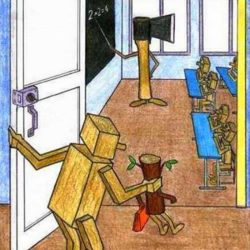This series of blogs focuses on learning and teaching in ways critical of a dominant paradigm in so-called ‘education’ in the early years of the 21st century. The dominant paradigm is the assumption that an idea called ‘the state’ is best placed to ‘educate’. A re-examination of the sound-shape ‘education’ will reveal the paradigm to be problematic, and show how the misuse of language contributes to the endurance of the paradigm. In general, the series will highlight a perception of an imbalance of power between the governed and the governors. A central question addressed in the series is, ‘By what right does the ‘state’ act to ‘educate’?’
I use the blogs to discuss an idea I call the learning-teaching relationship. I believe it is time to question the dominant paradigm and to concentrate on understanding the learning-teaching relationship. The idea of a learning-teaching relationship emerged from research I did as a PhD candidate in the field of education. The blogs discuss language, the human relationship, compulsory ‘education’, and assumptions about how and why the learning-teaching relationship matters, and to whom. They also discuss a range of related ideas, including consent, so-called ‘democracy’ and the illusion of freedom, the so-called ‘state’, bureaucrats and bureaucracy, knowledge, information, and taxes. How do all these ideas combine to become an opportunity to explore ways to reshape our understanding of the learning-teaching relationship? I believe they do, and I will propose a way ahead.
As Hume argued, the test of a belief isn’t its provable truth but its utility. I hope you will participate in the discussion in such a way as to bring into sharper relief the idea of a teaching-learning relationship whose utility speaks for itself.
All the ideas expressed in the series of blogs were formulated by giants who have gone before. I hope the way I re-present the ideas, and the perspectives I add to them, enthuses you to engage in what I believe to be a necessary revolution in the way we understand the learning-teaching relationship.

